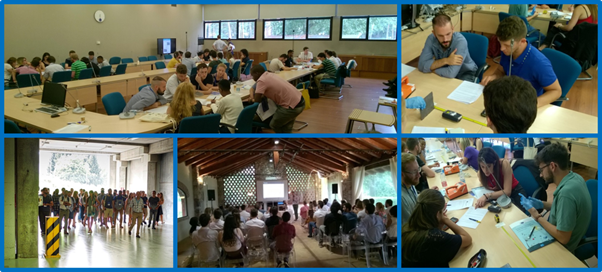The EU Energy Roadmap 2050 identifies nuclear energy as one of the routes to achieve the decarbonisation the EU energy system. Today, nuclear energy is the decarbonisation option providing the most of the low-carbon electricity consumed in the EU. However, the Nuclear Energy Sector is faced with some challenges in relation to preserving knowledge and skills in the sector. The growing nuclear non-power applications sector (e.g. radiation protection, medical, food), as well as the fusion sector, are likewise requiring highly skilled workforce and are recruiting their workforce from the same knowledge base.
The Council of the European Union concluded, on 1 December 2008, that it is “essential to maintain in the European Union a high level of education and training in the nuclear field” and, at the same time, preserve the skills that we already have.

The idea of a European Human Resources Observatory for the Nuclear Sector (EHRO-N) emerged within the European Nuclear Energy Forum (ENEF), which was launched by the European Commission’s Directorate General for Energy (DG Energy). The setting up of EHRO-N began in October 2009.
EHRO-N, is driven by organisations representing major stakeholders in the European Civil Nuclear Sector and managed by the European Commission’s Joint Research Centre (JRC). It is active in the field of Knowledge Management of competences and human resources in the nuclear sector. It also supports the implementation of European Frameworks for harmonization and mutual recognition of Education and Training in the Nuclear Sector.

Objectives
The objectives of the observatory is to:
1. Develop methodologies and best practices at EU level for performing workforce assessments and other aspects relevant to knowledge management of human resources in the nuclear area. Work should consider aspects such as common terminologies, job taxonomies and modelling tools;
2. Collect national workforce assessments, knowledge management programmes, surveys and other relevant information; review demand and supply of human resources and competences in the European nuclear sector and identify gaps and deficiencies in education and training infrastructures; elaborate recommendations for remedial actions and optimisations;
3. Support the implementation of European frameworks for nuclear qualifications and mutual recognition of E&T;
4. Communicate relevant data, analysis and findings to all the relevant stakeholders.
Organisation
The observatory consists of the following instruments:
Advisory Board (AB)
The Advisory Board is composed of high-level representatives from major EU/European nuclear stakeholder groups/networks and from international nuclear organisations and Commission services.
Current members of the Advisory Board are:
• ENEN (European Nuclear Education Network)
• ENS (European Nuclear Society)
• ETSON (European Technical Safety Organisations Network)
• EUTERP (European Training and Education in Radiation Protection Foundation)
• FORATOM (European Atomic Forum)
• FUSENET (European Fusion Education Network)
• IAEA (International Atomic Energy Agency)
• OECD-NEA (OECD - Nuclear Energy Agency)
• DG RTD (DG for Research and Innovation)
• JRC (Joint Research Centre)
The AB provides general and strategic guidance on conceptual issues, such as type of data, data quality, and required analysis, endorsement of major EHRO-N reports, preparation and execution of communication actions.
Expert Groups (EG)
The temporary Expert Group is responsible for implementing the activities or tasks decided by the AB.
Operating Agent (OA)
JRC is the Operating Agent, which provides the necessary infrastructure and technical network support, analyses capabilities and long-term stability. The Operating Agent is proposing initiatives to strengthen nuclear human resources capacity in EU.
